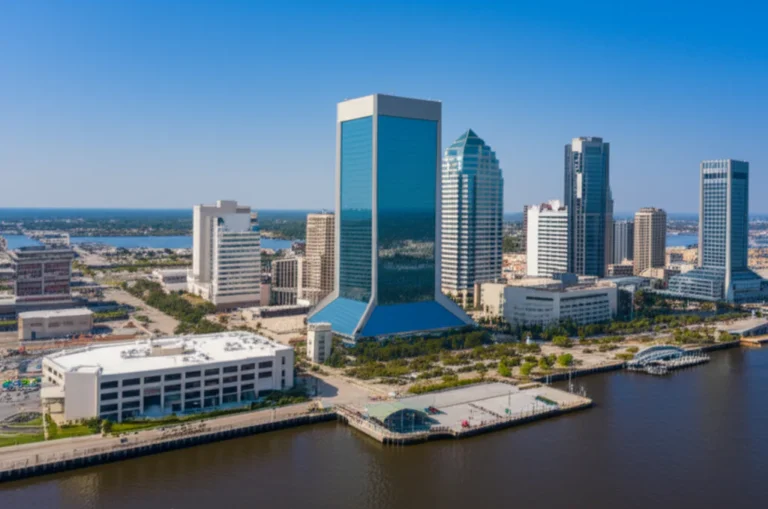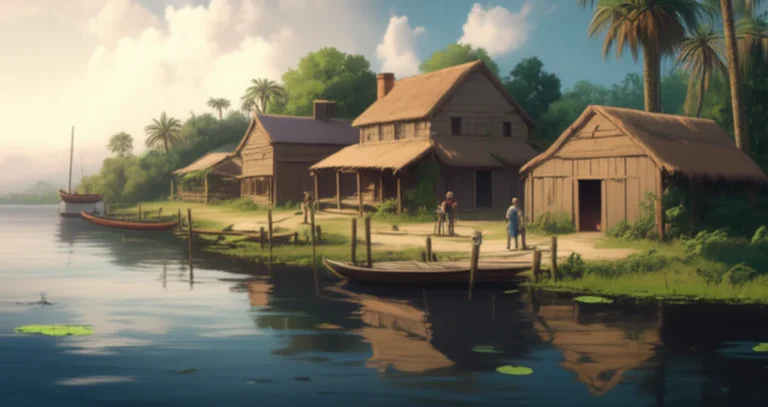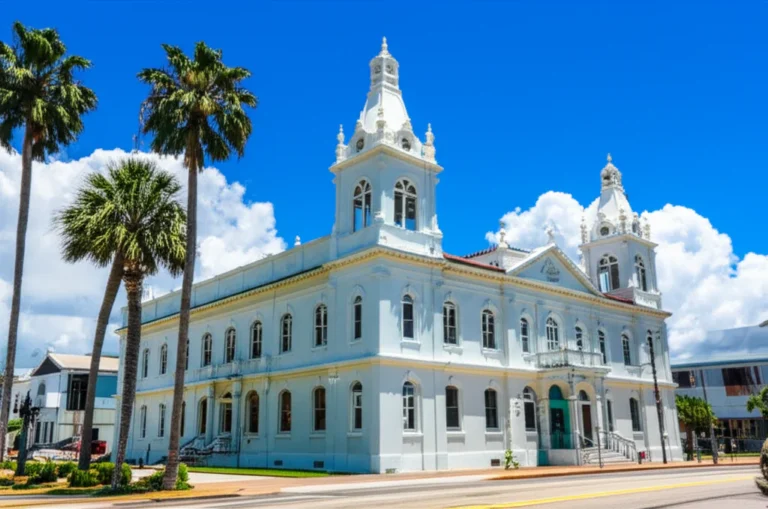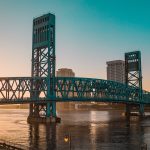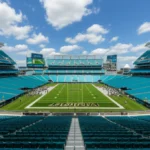Support our educational content for free when you purchase through links on our site. Learn more
When Was Jacksonville Founded? Uncover the Surprising Truths! 🏙️
Did you ever wonder exactly when Jacksonville was founded? You might think it’s a straightforward answer, but peel back the layers of history, and you’ll find a fascinating story that stretches back centuries—long before the city officially got its name. From early French explorers in 1564 to American settlers in 1822, Jacksonville’s origins are a rich tapestry of native heritage, colonial rivalry, and bold pioneers.
Stick with us as we unravel the timeline, reveal the real founders, and explain why the city was named after Andrew Jackson—even though he never set foot here! Plus, we’ll share some quirky facts and stories you won’t find in your average history book. Ready to see Jacksonville’s founding in a whole new light?
Key Takeaways
- Jacksonville’s official founding date is June 15, 1822, when American settlers laid out the town plan and named it after Andrew Jackson.
- The area was first settled by Europeans in 1564 with the French Fort Caroline, making it one of the earliest European settlements in North America.
- Before it was Jacksonville, the site was known as Cow Ford, a key river crossing used by Native Americans and early settlers.
- Isaiah D. Hart is considered the primary founder who helped organize and develop the town.
- The city’s name honors Andrew Jackson, the first military governor of Florida Territory, despite his never visiting the city.
- Jacksonville’s founding story reflects a complex mix of indigenous culture, European colonization, and American expansion.
Curious about the full story and the surprising twists? Keep reading to explore Jacksonville’s founding like never before!
Table of Contents
- ⚡️ Quick Tips and Facts About Jacksonville’s Founding
- 🌅 The Origins: How and When Jacksonville Was Founded
- 🏞️ Geographic Setting: Why This Spot Became Jacksonville
- 📜 Early Settlers and Native Influence: The Pre-Jacksonville Era
- 🗓️ Timeline of Jacksonville’s Key Founding Events
- 🏛️ Naming Jacksonville: Who Was Andrew Jackson and Why Him?
- 🏙️ Jacksonville’s Growth: From Settlement to City Status
- 🌐 Jacksonville’s Role in Florida’s Territorial and State History
- 📈 Demographic Shifts Since Founding: Population and Diversity
- 🏗️ Infrastructure and Urban Development Through the Ages
- 🎭 Cultural Evolution: Traditions Rooted in Jacksonville’s Founding
- ⚖️ Government Formation: Jacksonville’s Political Foundations
- 🧑 🤝 🧑 Notable Founders and Influential Figures in Early Jacksonville
- 🌍 Sister Cities and Jacksonville’s Global Connections
- 💡 Fun Facts and Lesser-Known Stories About Jacksonville’s Founding
- 📚 Recommended Links for Deep Dives on Jacksonville History
- ❓ Frequently Asked Questions About When Jacksonville Was Founded
- 📖 Reference Links and Source Material
- 🏁 Conclusion: Why Knowing Jacksonville’s Founding Matters Today
Hey there, fellow Jaxons! It’s your favorite team of local know-it-alls from Jax Facts™, here to settle the score on one of our city’s most fundamental questions: “When was Jacksonville founded?” The answer, like a summer afternoon on the St. Johns River, is a little more complex and way more interesting than you might think. Is it 1564? 1822? Let’s dive in, sort through the history, and give you the real story.
And for those of you wondering about the people behind the founding, we’ve got an in-depth look at Who Founded Jacksonville, Florida? Uncovering 4 Surprising Truths 🏙️ that you won’t want to miss!
⚡️ Quick Tips and Facts About Jacksonville’s Founding
Pressed for time? We get it. Here’s the lowdown on Jacksonville’s founding in a nutshell.
| Quick Fact 🤔 | The Skinny 👇 |
|---|---|
| Official Founding Date | June 15, 1822. This is when American settlers officially platted the town. |
| First European Settlement | 1564. French Huguenots established Fort Caroline, making this area one of the earliest European settlements in North America. |
| Original Name | Cow Ford (or Wacca Pilatka in Seminole), for a narrow spot on the river used for crossing cattle. |
| Named After | Andrew Jackson, the first military governor of the Florida Territory and future 7th U.S. President. |
| Incorporated as a City | February 9, 1832. This is when the town government was officially chartered. |
🌅 The Origins: How and When Jacksonville Was Founded
So, what’s the definitive answer? While Europeans had been kicking around the area for centuries (more on that later!), the city we know and love as Jacksonville was officially founded on June 15, 1822.
This was the day when a group of American settlers, led by the influential Isaiah D. Hart, decided it was time to create a proper town. Florida had just become a U.S. territory the year before, in 1821, after being ceded by Spain. These forward-thinking residents laid out a grid of 20 blocks on the north bank of the St. Johns River, transforming the frontier outpost known as Cow Ford into an organized community.
A petition was sent to the U.S. Secretary of State, John Quincy Adams, on that date, asking for Jacksonville to be recognized as an official port of entry. Though the request was initially denied, the name “Jacksonville” stuck, and a city was born.
🏞️ Geographic Setting: Why This Spot Became Jacksonville
Why here? Why this particular bend in the river? Location, location, location! The spot chosen for Jacksonville was no accident. For a deeper dive into our city’s layout, check out our articles on Jacksonville Geography.
The Strategic Importance of the “Cow Ford”
Long before it was Jacksonville, the area was known by the British as the “Cow Ford.” This name came from a narrow, shallow point in the St. Johns River that made it easy for cattle drivers to “ford” their herds across. The Seminole people called this same spot Wacca Pilatka, which translates to “cow’s crossing.”
This natural crossing point made the area a vital hub for transportation and trade long before paved roads and bridges. It was a strategic chokepoint for anyone moving up or down the Florida peninsula, making it the perfect place to build a town.
📜 Early Settlers and Native Influence: The Pre-Jacksonville Era
To truly understand our city’s founding, we have to rewind the clock—way back before 1822. The banks of the St. Johns River have been a desirable place to live for thousands of years.
The Timucua People
For centuries, the land was home to the Timucua people. They were a large and powerful group, with an estimated population of 200,000 across numerous chiefdoms in North Florida and South Georgia. The group living around modern-day Jacksonville was known as the Saturiwa. They lived in villages, practiced agriculture, and had a rich culture that thrived on the bounty of the river and coastal marshes. Sadly, contact with Europeans brought diseases that decimated their population.
🇫🇷 The French Arrive: Fort Caroline (1564)
Here’s where the timeline gets tricky. The first European attempt at a permanent settlement here was in 1564, when French Huguenots (Protestants) led by René Goulaine de Laudonnière established Fort Caroline on the St. Johns Bluff. This makes our little corner of Florida one of the very first sites of European settlement in the continental U.S.!
This French colony was short-lived. Religious and colonial rivalries were fierce, and the Spanish, who had already established a presence in St. Augustine, weren’t pleased.
🇪🇸 The Spanish Takeover (1565)
In 1565, Spanish forces attacked and conquered Fort Caroline, slaughtering most of the French colonists. They renamed the fort San Mateo and held control of the region for the next two centuries, with a brief interruption.
🇬🇧 The British Interlude and the King’s Road (1763-1783)
After the French and Indian War, Spain ceded Florida to Great Britain in 1763. During their 20-year rule, the British established plantations and built the King’s Road, a major artery connecting St. Augustine to Georgia that passed right through the Cow Ford, further cementing its importance.
So, was Jacksonville founded in 1564? ✅ Yes, if you’re talking about the first European settlement in the area. ❌ No, if you’re talking about the American city that bears the name “Jacksonville.” We at Jax Facts™ consider 1822 the official birthday of our city.
🗓️ Timeline of Jacksonville’s Key Founding Events
It’s a lot to keep straight! Here’s a handy timeline to visualize our city’s journey from a native settlement to a bustling American town.
| Year | Event | Significance |
|---|---|---|
| ~6,000 years ago | The area is inhabited by native peoples, later known as the Timucua. | Establishes the deep indigenous roots of the region. |
| 1564 | French Huguenots establish Fort Caroline. | The first European settlement in the area. |
| 1565 | Spanish forces capture Fort Caroline and rename it San Mateo. | Beginning of nearly 200 years of Spanish rule. |
| 1763 | Britain takes control of Florida. The settlement at the river crossing is called Cow Ford. | British influence grows; the King’s Road is built. |
| 1783 | Florida is returned to Spain. | A less successful period of Spanish rule begins. |
| 1821 | Spain cedes Florida to the United States. | The stage is set for American settlement. |
| June 15, 1822 | American settlers plat the town of Jacksonville. | The official founding of the city. |
| February 9, 1832 | Jacksonville is officially incorporated and granted a town charter. | The settlement becomes a legal, self-governing entity. |
🏛️ Naming Jacksonville: Who Was Andrew Jackson and Why Him?
Ever wonder why we’re not called “Cow Ford City”? The founders in 1822 wanted a name that symbolized the new American era for Florida. They chose to honor General Andrew Jackson.
At the time, Jackson was a national hero, famous for his military victories in the War of 1812 and the First Seminole War. More importantly, he was the first military governor of the new Florida Territory. Naming the town after him was a popular choice, a tribute to the man who represented American expansion and authority.
Here’s a fun fact for your next trivia night: Andrew Jackson never once set foot in the city named after him!
Of course, Jackson’s legacy is complex. He was also a slave owner and responsible for the forced removal of Native Americans, including the infamous Trail of Tears. This has led to modern debates about the city’s name, but for the founders in 1822, he was a symbol of American strength and leadership.
🏙️ Jacksonville’s Growth: From Settlement to City Status
Jacksonville didn’t stay a tiny 20-block settlement for long. Its prime location on the St. Johns River made it a natural center for commerce. The young town quickly became a key port, exporting cotton, timber, and oranges from Florida’s interior to markets in the North.
The growth was formalized on February 9, 1832, when the Florida Legislative Council approved a charter officially incorporating Jacksonville as a town. This gave the community its own government and the power to manage its rapid expansion.
🌐 Jacksonville’s Role in Florida’s Territorial and State History

From its very beginning, Jacksonville was a major player in Florida’s story. As the main commercial hub in Northeast Florida, its growth and fortunes were closely tied to the territory’s development. When Florida achieved statehood in 1845, Jacksonville was already one of its most important cities, a vital link in the trade network of the growing United States. Its strategic importance would be highlighted again during the Civil War, when it was occupied by Union forces multiple times.
📈 Demographic Shifts Since Founding: Population and Diversity
When founded in 1822, the settlement had an estimated population of about 250 people scattered along the river. From those humble beginnings, Jacksonville’s population exploded. For more on our city’s population, see our articles on Jacksonville Demographics.
By the late 1800s, it had become a bustling winter tourist destination, attracting tens of thousands of visitors annually. The 20th century brought even more growth, spurred by the military buildup for World War II and post-war prosperity. A pivotal moment came in 1968 with the Jacksonville Consolidation, when the city and Duval County governments merged. This instantly made Jacksonville the largest city by land area in the contiguous United States and dramatically increased its population.
🏗️ Infrastructure and Urban Development Through the Ages
The simple 20-block grid laid out in 1822 was just the beginning. Early infrastructure focused on the port, with docks and warehouses lining the riverfront. The city’s street names often honored national figures, like John Quincy Adams, or reflected the founders’ patriotism, like Liberty Street.
A catastrophic event reshaped the city’s development: the Great Fire of 1901. In just eight hours, the fire destroyed 146 city blocks and over 2,300 buildings. While a devastating tragedy, it spurred a massive rebuilding effort that created the modern cityscape we see today, with many beautiful examples of Prairie School architecture.
🎭 Cultural Evolution: Traditions Rooted in Jacksonville’s Founding
Jacksonville’s culture is a rich tapestry woven from its diverse history. The early influences of the Timucua, French, Spanish, and British can still be felt. The city’s identity as a Southern port town, a hub of trade and transportation, has shaped its character from the very beginning.
This blend of influences created a unique cultural landscape. In the early 20th century, for example, Jacksonville became the “Winter Film Capital of the World,” hosting over 30 silent film studios before Hollywood rose to prominence. This era, born from the city’s post-fire renaissance, is a perfect example of Jacksonville’s resilient and innovative spirit.
⚖️ Government Formation: Jacksonville’s Political Foundations
From an informal settlement to a chartered city, Jacksonville’s government has evolved dramatically. The 1832 charter was the first major step, creating a formal town government.
The single most significant event in our political history, however, was the 1968 Consolidation. Facing issues like urban decay, a polluted river, and government corruption, voters chose to merge the city and county governments. This bold move, officially enacted on October 1, 1968, created a single, powerful government responsible for the entire county, a structure that remains unique among major American cities.
🧑 🤝 🧑 Notable Founders and Influential Figures in Early Jacksonville
While Andrew Jackson got the naming rights, the real work of founding Jacksonville was done by a handful of determined settlers.
- Isaiah D. Hart: Widely considered the “most important founding father,” Hart was the driving force behind the 1822 town plan. He owned much of the original land and was a key civic leader. The iconic Isaiah D. Hart Bridge is named in his honor.
- John Brady: A fellow landowner whom Hart persuaded to join his town-building venture, Brady donated land for the first streets.
- John Warren: A former soldier who served under Andrew Jackson, Warren is credited with suggesting the name “Jacksonville.”
These men, along with others, laid the literal and figurative groundwork for the city we call home.
🌍 Sister Cities and Jacksonville’s Global Connections
Jacksonville’s role as a port city has always given it an international flavor. This is formally recognized through the Sister Cities International program, which fosters cultural and economic ties. Jacksonville is proud to be partnered with several cities around the globe.
| Sister City | Country |
|---|---|
| Bahia Blanca | Argentina |
| Changwon City | South Korea |
| Curitiba | Brazil |
| Murmansk | Russia (currently dormant) |
| Nantes | France |
| Nelson Mandela Bay | South Africa |
| San Juan | Puerto Rico |
| Yingkou | China |
💡 Fun Facts and Lesser-Known Stories About Jacksonville’s Founding
Think you know everything about Jax history? Let’s see!
- The Great Fire of 1901 was the third-largest urban fire in U.S. history, behind only the Great Chicago Fire and the 1906 San Francisco earthquake and fire. The glow from the flames was reportedly visible in Savannah, Georgia.
- As mentioned in the featured video, Jacksonville was a hub for smuggling weapons to Cuban rebels during their fight for independence from Spain in the late 19th century.
- During its “Winter Film Capital” days, Jacksonville was home to pioneering African American filmmakers who produced “race films” with positive, non-stereotypical roles, a stark contrast to films like Birth of a Nation.
- The oldest remaining slave quarters in Florida can be found at the nearby Kingsley Plantation, a powerful reminder of the complex history of the entire region.
📚 Recommended Links for Deep Dives on Jacksonville History
Want to keep exploring? Here are some fantastic resources for the history buffs out there:
- Jacksonville Historical Society: The ultimate authority on our city’s past.
- Timucuan Ecological and Historic Preserve: Explore the history of Fort Caroline and the area’s native inhabitants.
- Florida Memory – State Archives: A treasure trove of historical photos and documents, including many from Jacksonville.
❓ Frequently Asked Questions About When Jacksonville Was Founded
So, when was Jacksonville really founded?
The official date for the founding of the American city of Jacksonville is June 15, 1822. However, the first European settlement in the area, Fort Caroline, was established in 1564.
Who was Jacksonville named after?
It was named in honor of Andrew Jackson, the first military governor of the Florida Territory, who later became the 7th President of the United States.
What was Jacksonville’s original name?
Before it was named Jacksonville, the settlement was known as Cow Ford because it was located at a narrow crossing point on the St. Johns River used for herding cattle.
Is Jacksonville the oldest city in Florida?
No. While the French settlement of Fort Caroline (1564) predates it, St. Augustine (1565) is the oldest continuously inhabited European-established settlement in the United States.
📖 Reference Links and Source Material
For this article, we consulted a variety of trusted sources, including:
- The City of Jacksonville’s Official Website
- Visit Jacksonville
- Wikipedia’s entry on Jacksonville, Florida
- The Jacksonville Historical Society
🏁 Conclusion: Why Knowing Jacksonville’s Founding Matters Today

So, when was Jacksonville founded? The answer is delightfully layered. While the first European settlement in the area dates back to 1564 with the French Fort Caroline, the city we know as Jacksonville officially came into being on June 15, 1822, when American settlers laid out the town and named it after Andrew Jackson. This dual heritage—European colonial beginnings and American territorial development—gives Jacksonville its rich, complex identity.
Understanding this founding story helps us appreciate how Jacksonville grew from a strategic river crossing known as Cow Ford into Florida’s largest city by land area and a vibrant cultural hub. It also reminds us that history is never simple; it’s a tapestry of peoples, events, and decisions that shape a place over centuries.
Whether you’re a lifelong Jax resident or a curious visitor, knowing the roots of our city enriches your connection to it. So next time you cross the Isaiah D. Hart Bridge or stroll through historic neighborhoods, remember: you’re walking through layers of history that began long before the city’s official birthday.
📚 Recommended Links for Deep Dives on Jacksonville History & Shopping
If you want to dive deeper into Jacksonville’s fascinating past or pick up some great reads about Florida’s history, check these out:
-
Books on Jacksonville and Florida History:
-
Explore Fort Caroline and Timucuan Preserve:
-
Jacksonville Historical Society:
❓ Frequently Asked Questions About When Jacksonville Was Founded
What was founded in Jacksonville Florida in 1953?
In 1953, Jacksonville saw the establishment of several important institutions and infrastructure developments, but no major founding event like the city’s origin. However, this period was part of the post-World War II boom that led to rapid urban expansion and modernization. For example, the Jacksonville Zoo and Gardens began to take shape during the mid-20th century, becoming a beloved local attraction. The city’s growth in the 1950s set the stage for the eventual consolidation with Duval County in 1968.
What was the original name of Jacksonville Florida?
Before it was called Jacksonville, the area was known as Cow Ford by the British settlers, and as Wacca Pilatka by the Seminole Indians. The name referred to a narrow crossing point on the St. Johns River where cattle were driven across. This natural ford was a key geographic feature that made the location ideal for settlement and trade.
Who was Jacksonville founded by?
Jacksonville was primarily founded by Isaiah D. Hart, a visionary landowner and entrepreneur who, along with other settlers like John Brady and John Warren, laid out the town plan in 1822. Hart donated much of the land and was instrumental in petitioning the U.S. government to recognize the town. These men, along with a small group of settlers, transformed the Cow Ford settlement into the organized town of Jacksonville.
What historical events influenced the founding of Jacksonville?
Several key historical events shaped Jacksonville’s founding:
- The cession of Florida from Spain to the United States in 1821, which opened the door for American settlement.
- The strategic importance of the Cow Ford crossing on the St. Johns River.
- The legacy of European colonial competition, including the French establishment of Fort Caroline in 1564 and subsequent Spanish control.
- The military and political prominence of Andrew Jackson, whose name the town adopted to symbolize American sovereignty.
Who founded Jacksonville, Florida?
While many contributed, Isaiah D. Hart is widely recognized as the principal founder of Jacksonville. His leadership in land acquisition, town planning, and civic organization was critical to the city’s birth. Hart’s vision and efforts earned him the title “Father of Jacksonville,” and his legacy lives on in landmarks like the Isaiah D. Hart Bridge.
How did Jacksonville get its name?
Jacksonville was named in honor of Andrew Jackson, the first military governor of the Florida Territory and later the seventh President of the United States. The founders chose this name in 1822 to reflect the new American governance and to honor Jackson’s role in securing Florida for the United States. Interestingly, Jackson himself never visited the city.
What was Jacksonville like in its early years?
In its early years, Jacksonville was a small but growing river town centered around trade and agriculture. The population was modest, with settlers engaged in farming, timber, and shipping goods via the St. Johns River. The town’s grid was simple, and life revolved around the riverfront docks and local markets. Despite challenges like conflicts with Native Americans and the occasional hurricane, Jacksonville steadily grew into a regional commercial hub.
📖 Reference Links and Source Material
For those who want to verify facts or explore further, here are trusted sources we used:
- City of Jacksonville Official Website: https://www.jacksonville.gov/welcome/welcome-news/jacksonville
- Visit Jacksonville History: https://www.visitjacksonville.com/about/research-information/history/
- Wikipedia: Jacksonville, Florida: https://en.wikipedia.org/wiki/Jacksonville,_Florida
- Jacksonville Historical Society: https://www.jaxhistory.org/
- National Park Service – Timucuan Ecological and Historic Preserve: https://www.nps.gov/timu/index.htm
- Sister Cities International: https://sistercities.org/
Thanks for joining us on this journey through Jacksonville’s founding! Stay curious, Jax friends. 🌴⚓

